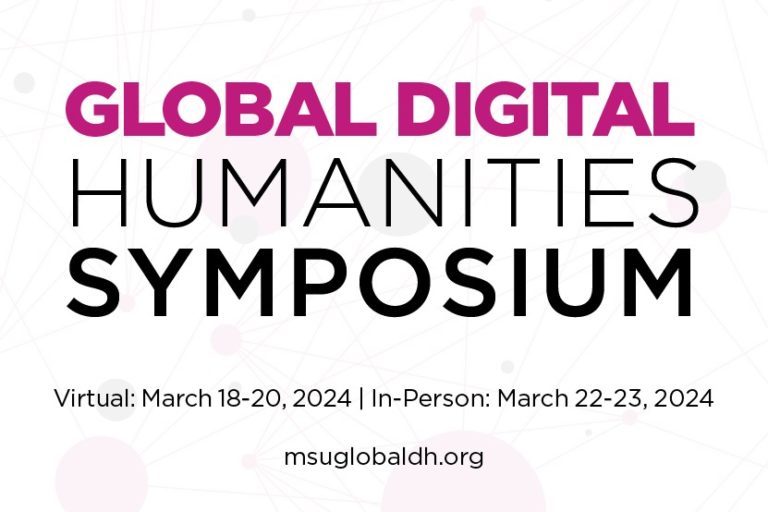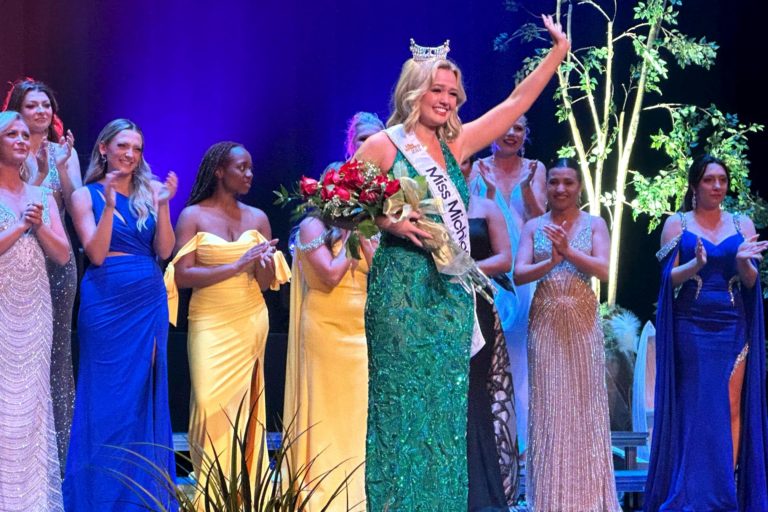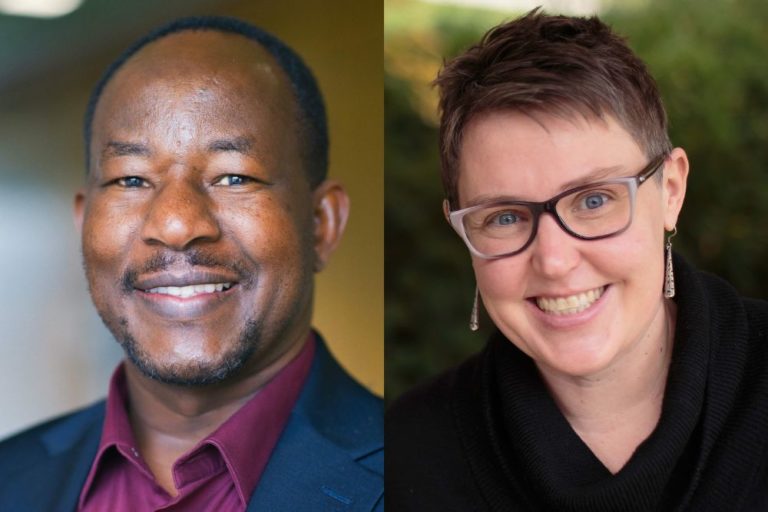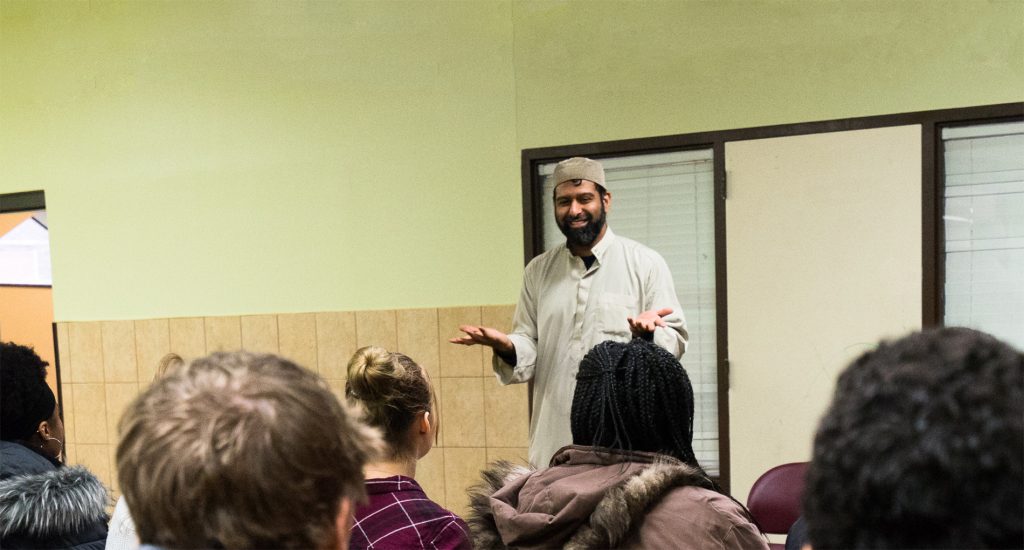
In a time when Arab and Islamic communities often face hostility and discrimination and are simply misunderstood, one Citizen Scholars class seeks to create greater awareness and better cultural understanding of Islam and the Arab world, with a specific focus on the Middle East.
Taught by Assistant Professor of Arabic Camelia Suleiman, the class – Democratic Discourse and Critique: The Middle East Voices of the Arab Uprisings – was first offered this past semester and will return again in spring 2018.
Coming into the class, most of the students, all freshmen, had no or very limited knowledge of the Arab states or Islam, the dominant religion of the region.
“All I knew was what I learned in high school where we briefly covered the five major religions of the world, which is to say I knew practically nothing about anything to do with the Middle East or Islam,” said Eli Drake, a double major in Theatre and Global Studies in the Arts and Humanities. “This class gave us a lot of history and background knowledge, which has opened my eyes so much.
“And even if you don’t end up going into a field where this knowledge is considered crucial to your career, it is still good knowledge to have as a citizen.”
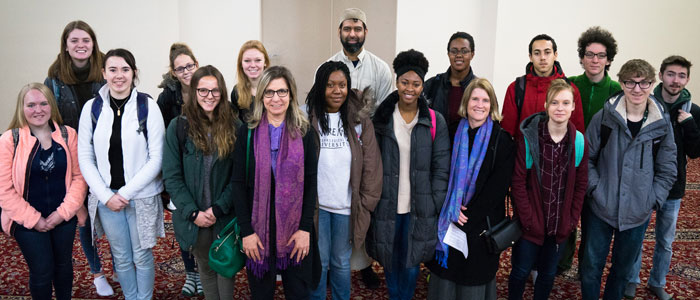
Suleiman said she was surprised to learn at the beginning of the semester how much Sept. 11 and its aftermath had shaped student opinions about the Middle East.
“Not in a bad way, but I wasn’t expecting that,” she said. “However, these students grew up in that era, and they don’t know anything better. They are trying to sort it out on their own, and my class helped them sort out the very complicated relationship the United States has with the Middle East.
“They now realize the importance of this region to the United States and are now better informed and better equipped. I wanted to give them not facts per se, but tools so that they build their own knowledge about the region.”
Experiential Learning Through Community Engagement
Besides readings, films, and classroom discussions, there were several experiential learning opportunities to enhance student learning and to allow them to engage with the local Arab and Muslim communities.
They toured the Islamic Center of East Lansing, where they also attended a welcome dinner for refugee families who recently came to the United States, and visited the St. Joseph Melkite Catholic Church in Lansing, where they volunteered their time interviewing parishioners and archiving their stories of immigration.
“Being able to meet and interact with these people made it real. I can now put faces to a community that I had no previous interactions with,” Drake said. “It made everything more significant, and my opinions have been made stronger.”
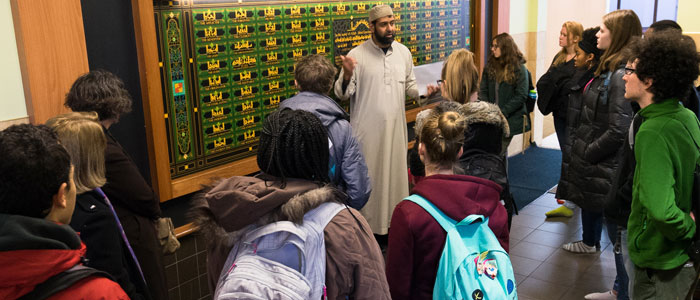
During the visit to the Islamic Center, the class met with Iman Suhail Chaudry, who recited the first chapter of the Koran; talked about the religion, its history, and the misconceptions; answered questions; and gave them a tour.
At St. Joseph Melkite Catholic Church, where most of the parishioners are either Palestinian from the villages of northern Israel or southern Lebanon, Father James Graham talked about the history of the church in both the Middle Eastern context and the American context and explained all the icons on the church walls.
The students also interviewed several of the St. Joseph Melkite parishioners in order to record their stories of immigration and why they came to the United States. These interviews were uploaded to the church website.
The church wishes to continue with this archive project, and when the class is offered again in spring 2018, it will continue collecting and archiving these stories.
This class gave us a lot of history and background, which has opened my eyes so much.
“I spoke with a woman who was not even 10 years older than me. She talked about when she came over how she was married and pregnant, but she couldn’t sponsor her husband yet, so he had to stay there the whole time she was pregnant and even after the child was born. He missed a lot of the child’s milestones. He was really upset about that and so was she,” said Jennifer Bishop, Zoology major.
These off-campus opportunities were organized with the help of MSU’s Office of Community Engagement and Christie Schichtel, Academic Service Learning Specialist.
Guest Speakers and Essays
In addition to the community engagement experiences, a number of guest speakers visited the class, including:
- Russell Lucas, Director of Global Studies at MSU, who talked about the regimes of the Middle East and why the Middle East ended up with dictators;
- Khalida Zaki, a sociologist and emeritus from MSU, who works extensively with refugees and talked about her experience as a fully practicing Muslim woman in the United States;
- Deborah Margolis, head librarian for the MSU Library Middle East section, who coached the students on how to look up resources on the Middle East and what resources to trust and not trust.
Each student in the class wrote three essays, one in which they were asked to link their major to what they were learning in class. Some of the topics included contemporary and ancient Egyptian theatre, Middle Eastern apparel, 20th century music and its influence on the Egyptian revolution, Islamic influences in Spain, Maltese culture and language as a crossroad between Europe and the Middle East, ancient trade routes as points of cultural exchange between Europe and the Middle East, and the importance of camels in the Middle East.
I am a lot more passionate about working with this community,
Some of the students presented these essays at the Citizen Scholars Showcase held at the MSU Union in April.
“It was really nice to be told to find your specific area of interest and do whatever you want with it,” Drake said, “and then to have the opportunity to take what we were learning here and present it to the outside, that was a valuable experience.”
Throughout the semester, the students each kept a journal about what they were learning in the class.
“The journals helped us process everything we were learning by taking it from a wider discussion to a more personal context and applying it to our own lives through our own experiences,” said Grace Beltowski, a double major in English and Professional Writing.
A Thirst for More Knowledge
One goal Suleiman had for the class was to arouse the curiosity of the students, leaving them wanting to learn more about the Middle East and Islam. Judging from the comments made by the students, she was successful in doing that.
They now realize the importance of this region to the United States and are now better informed and better equipped.
“They all had expressed that they want to continue to learn more about this important region,” Suleiman said.
Several students also indicated they want to volunteer at local refugee centers and become involved in organizations that support refugees.
“I am a lot more passionate about working with this community,” Drake said, “and plan to seek out a lot more opportunities to do so.”
A true success story indeed.
